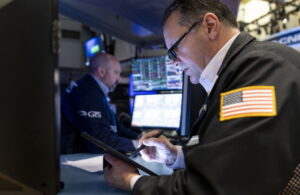The sell off recorded in US markets since last week is deep, and not only continues, but is affecting foreign markets.
The Wall Street closed yesterday’s session with heavy losses. The Dow Jones was down 2.6%, the S&P 500 was down 3% and the Nasdaq took a 3.43% “plunge.”
Japan’s Nikkei 225 index fell 12%, recording its worst decline in history. Meanwhile, all major Asian and European markets fell significantly yesterday (5/8), with the Athens Stock Exchange unable to “escape”, “erasing” almost all of its 2024 gains.
But why are investors selling off their shares?
According to CNN, three fears are emerging simultaneously: The growing chances of a recession, concern that the Federal Reserve failed to act in time, and the belief that big bets on artificial intelligence may not pay off.
Will there eventually be a recession?
The more important issue is the fear that the US economy is in much worse shape than previously believed, a view based on Friday’s unexpected rise in the unemployment rate.
On Friday, the Labor Department reported that the U.S. economy added just 114,000 jobs in July – far fewer than analysts had expected – with the unemployment rate rising to 4.3%. While as a number the rate is not large, its sudden rise is alarming, as last year, unemployment was at a decades-low.
Note that the US economy remains strong. Last quarter, it grew much more than expected, boosted by consumer spending, which accounts for more than two-thirds of total GDP.
However, fears of a recession are growing. Goldman Sachs economists on Monday raised the odds of a recession to 25 percent over the next 12 months. The figure is still not high because the economic data look strong and the Fed has plenty of room to cut interest rates from a 23-year high.
But it should be noted that before the jobs report, the bank was giving a 15% recession probability.
The Fed in the crosshairs
The stock market had set records this year, boosted by falling inflation and a growing sense that the Fed will start cutting rates, which could boost corporate earnings.
But the Fed didn’t cut rates as many had hoped last week, with the market now increasingly seeing the wait-and-see stance as a “mistake.”
The rate cuts could help support the labor market by lowering borrowing costs for businesses and freeing up capital that companies could spend on hiring. But policy decisions take time to be absorbed by the economy. As inflation has fallen dramatically in recent months and the unemployment rate has risen, some fear the Fed may be planning to act when it is too late, with slow hiring having turned into rampant layoffs.
With the Fed’s next meetings scheduled for September, November and December, analysts at Citigroup and JPMorgan predict the Fed will cut rates by half a point at its next two meetings. However, it may be forced to make an emergency rate cut before then, an intervention that the market sees as increasingly likely, according to CME’s FedWatch tool.
An emergency cut, which hasn’t happened since the early days of the pandemic, is exactly what the Fed should do, famed Wharton economics professor Jeremy Siegel told CNBC.
A.I. causes concern
Stocks have also posted high gains in the past two years due to big bets on tech companies involved in artificial intelligence. Many investors were hoping AI would be behind a global industrial revolution.
With that scenario looking difficult, investors are starting to sell off, with stocks such as Apple, Nvidia, Microsoft, Meta, Amazon and Alphabet having risen since early last year.
Warren Buffett, CEO of Berkshire Hathaway, sold half the stake the company held in Apple shares, a worrying sign for the health of the tech sector.
Because these companies have a market capitalization of close to $1 trillion or more and make up a huge chunk of the S&P 500’s total value, when investors sell off shares of them, the negative impact on the broader market is enormous.
End of the carry trade
A “bonus” fear factor appears to be the end of the popular “carry trade” between the yen and the dollar. This is a practice in which an investor borrows in a currency with low interest rates, such as the yen, and reinvests the proceeds in a currency with a higher rate of return, usually the euro or dollar.
The Japanese currency’s exchange rate strengthened sharply after the Bank of Japan (BoJ) raised its benchmark interest rate last week and decided to restrict purchases of Japanese government bonds. This resulted in a very profitable curry trade between the yen and the dollar being closed, destabilising markets and triggering a wave of selling.
What comes next
Investors are now selling oil, cryptocurrencies and especially tech stocks. Instead, they are turning to safe havens like bonds.
In any case, there is no need to panic, as this is not a market crash. At least not yet. Investors are nervous, but not panicky, and the question now is how long this fear will last before investors feel there is opportunity in the market.
Ask me anything
Explore related questions





